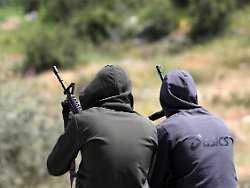Theaters in the West Bank
Jenin – the ticking time bomb
Von Tal Leder, Jenin
05/01/2022 15:07
The city, which is a symbol of resistance for Palestinians, is a stronghold of terror for Israel. Despite the tense situation, peace activists are hoping for an end to the conflict.
The Palestinian theater production “Stolen Dream” tells the story of a young man in the West Bank who wants to go to the sea. Blockades by the Israeli occupiers and corruption in the Palestinian Authority make it impossible to realize his dream. The drama comes from the youth drama group of the Freedom Theater in the refugee camp in Jenin and pays homage to its founder Juliano Mer Khamis.
The son of an Israeli Jew and a Christian Palestinian, who saw art as a revolutionary act of non-violent resistance, was shot dead by an Islamist in front of the theater in 2011. Despite the attack, the town in the north of the West Bank – which was a stronghold of suicide bombers during the second Intifada until 2005 – has been viewed as a prime example of the boom in Palestinian cities in recent years. In the meantime, it has again become the center of militant groups. Two of the attackers in the recent attacks in Israel, which killed 14 people, were from Jenin.
“Jenin is like a withered tree,” says Ahmad al-Tubasi, the artistic director of the Freedom Theater. “Economic growth has whitewashed the political situation.” In fact, the changes in the small town of 50,000 did not come suddenly. While it is one of the most conservative in the West Bank, economic improvement eased the situation as it uprooted terrorism. Corona ended this success story. Fearing the spread of the pandemic, Israel closed the checkpoints and no one could enter or exit the Palestinian territories. As a result, the Israeli Arabs, who otherwise came to Jenin to shop, did not have the foreign currency. Palestinians were also no longer allowed to work in Israel, fueling resentment and playing into the hands of radical forces such as Hamas, Islamic Jihad and the resurgent al-Aqsa Brigades.
Theater as therapy
“The past will be present in the future,” says al-Tubasi. The dusty alleys around the ramshackle rail depot from the British Mandate period are controlled by armed militiamen, the crooked walls here are covered with posters of countless “martyrs”. The cultural site, which has been criticized for being close to the anti-Semitic BDS movement, is visited by many for therapeutic reasons. “We work with the people to choose an alternative path,” says al-Tubasi. “It’s to enable them to resist terror, to be something other than a martyr.”
For the Palestinians, the refugee camp in Jenin is a symbol of resistance. Jordan built it in 1953 for Palestinians displaced and fleeing the first Middle East War in 1948. After the 1967 Six Day War, when Israel conquered the West Bank, the city came under Israeli control until 1996, before being handed over to the Palestinian Authority under the Oslo Accords. Since the PA is hated for being corrupt in large parts of its dominion and could not control many cities, a vacuum was created that was filled by radical forces. At the height of the second Intifada in 2002, the Israeli armed forces launched “Operation Defensive Shield,” which was able to curb terror but not eliminate it completely. Only with the construction of the barrier separating Israel from the Palestinian territories was the number of attacks significantly reduced.
Enlightenment and Feminism
Triggered by the latest wave of terror in Israel, the Israeli army sealed off the West Bank again. Many raids have involved battles with well-organized armed groups, killing some and arresting many. “Our operation took the terrorists linked to the attacks by surprise,” said Lt. Col. Matan Feldman, reconnaissance commander of an Israeli brigade. They were supported by units that secured the destroyed security fence. The 759-kilometer barrier was not completed, and in some places Palestinians find loopholes to get to Israel – either to find work or to carry out attacks. Radical forces are reportedly offering $300 for it. “You can’t defeat terrorism,” says Lt. Col. Feldman. “But with better education, we can prevent its upswing.”
The Israeli Lily Traubman from Kibbutz Megiddo, not far from the barrier near Jenin, shows that it is also possible to live together. The Chilean-born rehabilitation therapist joined the “Women in Black” movement during the first Intifada in 1988 to demonstrate against Israeli occupation policies. “I contacted Palestinian women’s movements in Jenin,” says the peace activist. “Our echo was well received there and so we joined forces.”
“The Palestinians are tired”
The women’s rights activist is convinced that there is something universal about feminism that allows them to close gaps to enable joint projects. She also believes that women can drive the peace process and bring a multifaceted approach to ending the Middle East conflict. “Mutual respect is our job,” says Traubman. “We need a more open view, based on democratic values.”
There are people in the West Bank who share this position. After decades of occupation, Islamism and terror, they want change. “The Palestinians are tired,” says Ahmad al-Tubasi from the Freedom Theater in Jenin. “People need change. They dream of freedom, prosperity and an end to violence.” He is convinced that both peoples have a right to this country and would like the peace process to be reinvigorated. He relies on the controversial concept of the “one-state solution”, a common state for Israelis and Palestinians. “Federalism is the formula,” he believes. “Because at some point the time will come when the hate has to stop.”
